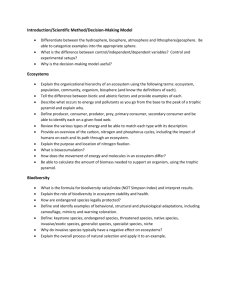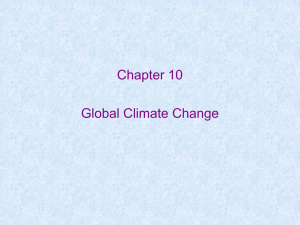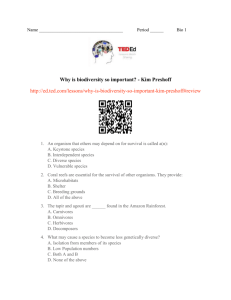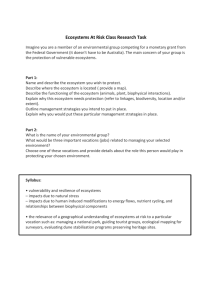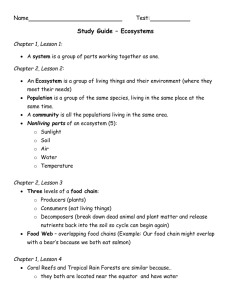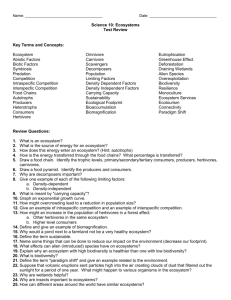The TEEB project - Economics of Ecosystems and Biodiversity
advertisement
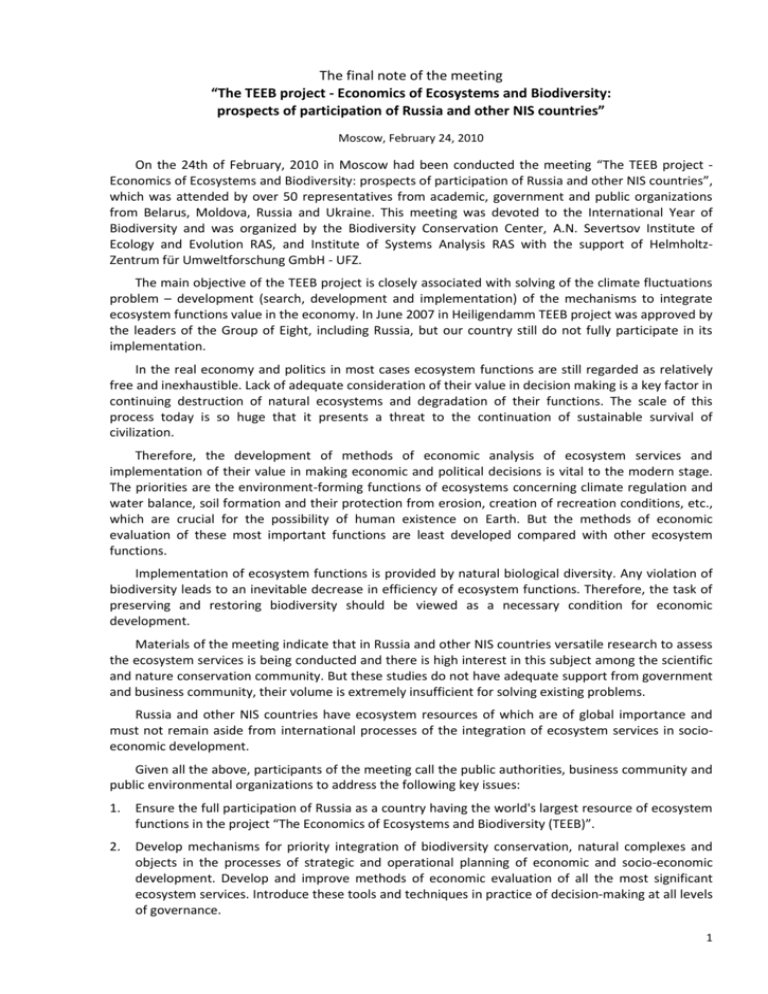
The final note of the meeting “The TEEB project - Economics of Ecosystems and Biodiversity: prospects of participation of Russia and other NIS countries” Moscow, February 24, 2010 On the 24th of February, 2010 in Moscow had been conducted the meeting “The TEEB project Economics of Ecosystems and Biodiversity: prospects of participation of Russia and other NIS countries”, which was attended by over 50 representatives from academic, government and public organizations from Belarus, Moldova, Russia and Ukraine. This meeting was devoted to the International Year of Biodiversity and was organized by the Biodiversity Conservation Center, A.N. Severtsov Institute of Ecology and Evolution RAS, and Institute of Systems Analysis RAS with the support of HelmholtzZentrum für Umweltforschung GmbH - UFZ. The main objective of the TEEB project is closely associated with solving of the climate fluctuations problem – development (search, development and implementation) of the mechanisms to integrate ecosystem functions value in the economy. In June 2007 in Heiligendamm TEEB project was approved by the leaders of the Group of Eight, including Russia, but our country still do not fully participate in its implementation. In the real economy and politics in most cases ecosystem functions are still regarded as relatively free and inexhaustible. Lack of adequate consideration of their value in decision making is a key factor in continuing destruction of natural ecosystems and degradation of their functions. The scale of this process today is so huge that it presents a threat to the continuation of sustainable survival of civilization. Therefore, the development of methods of economic analysis of ecosystem services and implementation of their value in making economic and political decisions is vital to the modern stage. The priorities are the environment-forming functions of ecosystems concerning climate regulation and water balance, soil formation and their protection from erosion, creation of recreation conditions, etc., which are crucial for the possibility of human existence on Earth. But the methods of economic evaluation of these most important functions are least developed compared with other ecosystem functions. Implementation of ecosystem functions is provided by natural biological diversity. Any violation of biodiversity leads to an inevitable decrease in efficiency of ecosystem functions. Therefore, the task of preserving and restoring biodiversity should be viewed as a necessary condition for economic development. Materials of the meeting indicate that in Russia and other NIS countries versatile research to assess the ecosystem services is being conducted and there is high interest in this subject among the scientific and nature conservation community. But these studies do not have adequate support from government and business community, their volume is extremely insufficient for solving existing problems. Russia and other NIS countries have ecosystem resources of which are of global importance and must not remain aside from international processes of the integration of ecosystem services in socioeconomic development. Given all the above, participants of the meeting call the public authorities, business community and public environmental organizations to address the following key issues: 1. Ensure the full participation of Russia as a country having the world's largest resource of ecosystem functions in the project “The Economics of Ecosystems and Biodiversity (TEEB)”. 2. Develop mechanisms for priority integration of biodiversity conservation, natural complexes and objects in the processes of strategic and operational planning of economic and socio-economic development. Develop and improve methods of economic evaluation of all the most significant ecosystem services. Introduce these tools and techniques in practice of decision-making at all levels of governance. 1 3. Proceed to the formation of national markets for ecosystem services in Russia and other NIS countries, which will help to achieve long-term development goals — greening the economy and businesses, reduce resource and energy intensity of goods and services production, will become an important tool for optimizing the inter-regional relations (between the regions with developed industry and regions with a significant ecosystem resources). Start development of national carbon market in Russia as one of the most elaborated forms of markets for ecosystem services. Ensure adequate coverage of global functions of Russian ecosystems on storage and carbon accumulation. Identify and realize environmental benefits of Russia and other NIS countries in practice of international negotiations on markets for ecosystem services. 4. Restore the state ecological expertise for all economic objects and projects that can harm wildlife and cause changes in ecosystem functions, i.e. to reduce the quality of ecosystem services. 5. Restore the Environment Fund of the RF (or similar) and its regional offices as a way of support for environmental projects, including development of economic methods of valuation of ecosystem functions and biodiversity. 6. By carrying out any activity affecting the environment, it is necessary to adhere to the precautionary principle (Rio de Janeiro, 1992), i.e. at high risk of damage to the environment and the substantial deterioration of its condition and the absence of sufficient knowledge and information about the mechanisms of these risks it is necessary to strive for minimum impact on ecosystems and to take measures to preserve and protect them. 7. Encourage the formation of interdisciplinary expert community in the field of assessment of ecosystem services and the development of methods for their integration into the political and economic decisions at the national and international levels in Russia and other NIS countries. 8. To maximize the opportunities provided in 2010 the International Year of Biodiversity to discuss ways of integrating ecosystem services into economic and social development at international forums (meetings of G8 leaders, conferences on biodiversity, etc.). 9. Recommend that Biodiversity Conservation Center would create online public information resource on ecosystem services and methods of their evaluation, which will facilitate the activities and the consolidation of the expert community, raising awareness of stakeholders. 10. Promote cooperation across the whole spectrum of issues related to ecosystem services among the former Soviet Union. 2

